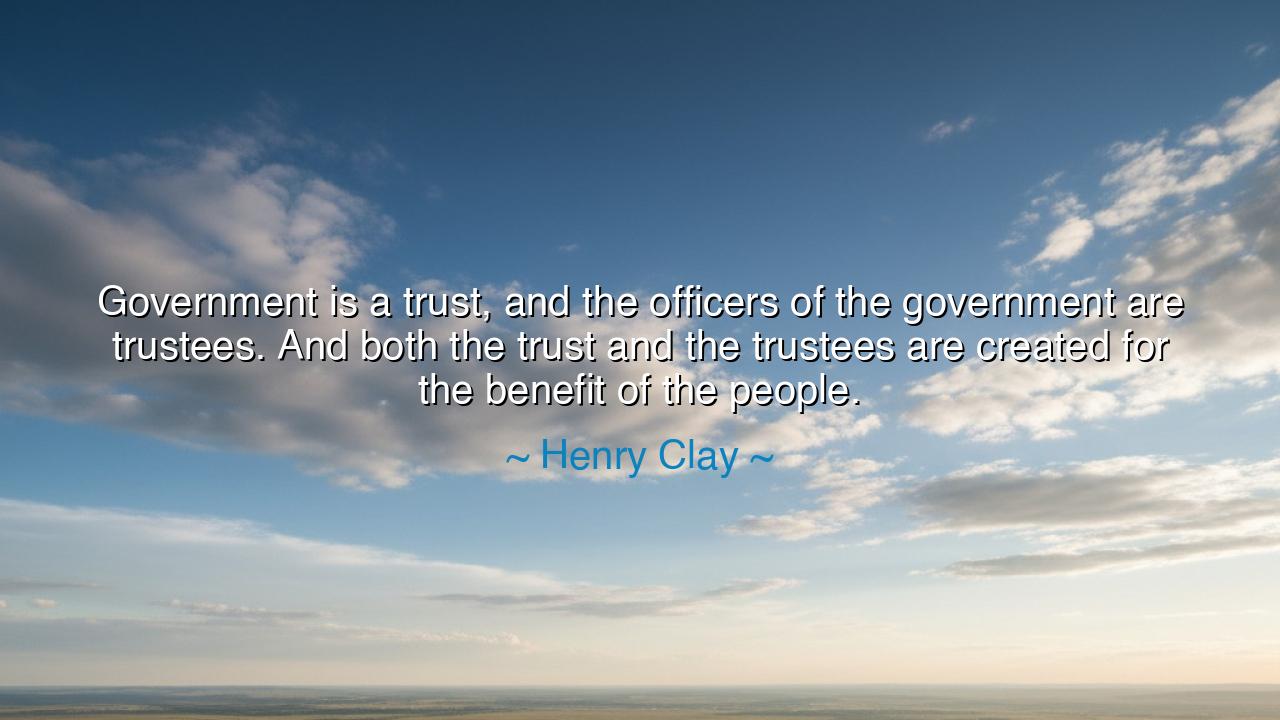
Government is a trust, and the officers of the government are
Government is a trust, and the officers of the government are trustees. And both the trust and the trustees are created for the benefit of the people.






“Government is a trust, and the officers of the government are trustees. And both the trust and the trustees are created for the benefit of the people.” — so spoke Henry Clay, the statesman whose words echo with the weight of civic virtue and divine responsibility. These are not the idle musings of a politician, but the utterance of a man who glimpsed the sacred balance between power and duty, between authority and service. To understand this truth is to see governance not as dominion, but as guardianship — a solemn covenant between rulers and the ruled, sealed not by the sword, but by trust.
In the ancient world, wise philosophers taught that leadership was a stewardship of the soul of the people. To rule was not to command, but to care. Just as a shepherd watches over his flock, so too must the trustees of government guard the welfare of their citizens. For power, when divorced from benevolence, corrupts swiftly — it devours itself like fire consuming the dry grass. Clay’s declaration calls upon all who govern to remember that their office is not their possession; it is a sacred trust, bestowed by the people, sustained by their faith, and judged by their welfare.
Consider the story of Marcus Aurelius, the philosopher-emperor of Rome. Though he held the might of legions, he ruled with humility and introspection. Each dawn, he reminded himself: “You are but a servant of mankind.” Amid wars, plagues, and betrayals, he labored not for his own glory, but for the good of the empire — writing in his meditations that a ruler must “live for others, not himself.” Thus he fulfilled the meaning of trust — that power exists not for the elevation of one, but for the prosperity of all. History remembers him not merely as a conqueror, but as a guardian of duty.
Contrast this with those whose hearts grew swollen with pride. When kings and ministers forget that their power flows from the people, they betray the very trust that sustains them. Empires have fallen, nations have burned, and countless lives have been lost because the trustees of power became its worshipers. The fall of France’s ancien régime, the exile of tyrants, the revolutions that swept continents — all bear witness to the truth Clay spoke: when government ceases to serve, the people, as the true masters, reclaim their right.
Yet this teaching is not for rulers alone. It speaks to every soul who holds even a fragment of authority — in the home, in the marketplace, in the community. To lead, in any form, is to be entrusted with the well-being of others. Each of us, in our own station, becomes a trustee of something greater — of fairness, of compassion, of justice. The measure of our worth is not what we take, but what we safeguard and give.
Therefore, let each citizen remember: the government is the people’s creation, not their master. Its officers are but stewards of the common good, answerable to the conscience of the nation. And if ever they falter, it is the duty of the people to awaken them — not with wrath, but with the firm hand of reason and the unyielding demand for integrity. A free people must guard their liberty as the ancients guarded sacred fire — feeding it with vigilance, lest it fade into ash.
The lesson is thus: Power is not ownership; it is responsibility. Let all who wield it act as trustees before the altar of the public good. Let them govern with justice, humility, and compassion. And let the people, in turn, cherish their own duty — to choose wisely, to speak truth, and to hold their leaders accountable. For the health of a nation depends not on the splendor of its rulers, but on the trust that binds its people together in shared destiny.
So, my child, if you would honor the wisdom of Henry Clay, then wherever life grants you influence — in your words, your work, or your care for others — treat it as a trust. Guard it well, use it justly, and remember always: you are a trustee of humanity, and the world is your sacred charge.






AAdministratorAdministrator
Welcome, honored guests. Please leave a comment, we will respond soon